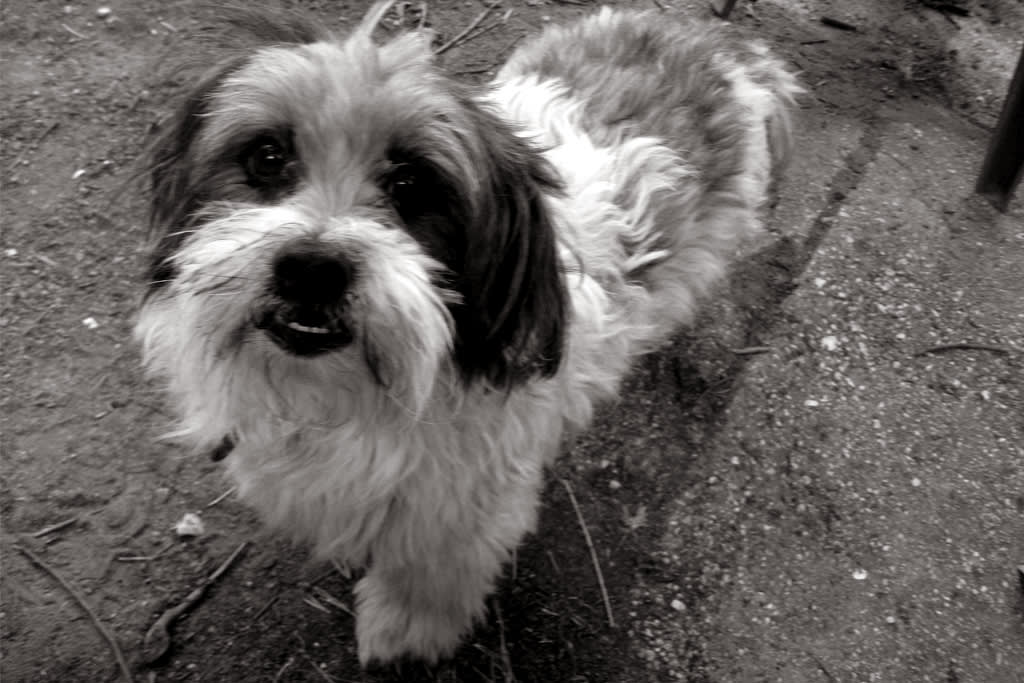Bunny's Guide to Happiness
Becoming the Best Stinking Version of Yourself

I've been informed ‘Bunny’ is the kind of nickname the English upper crust would give each other in the 20's. My Grandmother was born in 1919, and was well into her 80's when she adopted Bunny as a puppy. He was a black and white Maltese Shitzu, but not entirely what she had in mind. From the beginning, Grandma referred to him exclusively as 'she' or ‘her’. Bunny grew bigger than most of his breed but she insisted on having him groomed in a Pekingese style with a short fringe and hair grown well past his ears. She perhaps imagined some little gremlin, who hissed and spat from the sleeve of a Chinese empress - but Bunny was not that. Still, such was my grandmother's single-mindedness that she simply assumed Bunny would become what she wanted him to be. Bunny would urinate with a squat rather than a cocked leg. I'm aware that it's not all that unusual in male dogs, but my father and uncle still speculated he’d been trained by force to keep his leg down - most likely with a jab to the ribs with her walking stick. They found Bunny an endearing character and treated him with the sympathy of some estranged sibling who was enduring the same trials they had known as boys.
My favourite story about my grandmother was during the 2nd World War, when she served at a barracks in some administrative capacity. She was court martialled for leading a 'platoon of typists' away from the barracks to a nearby dance hall. Grandma was charismatic and embracing but she could be witheringly cruel if disobeyed. Bunny was utterly besotted, devoted, and probably terrified.
Grandma and Bunny would stroll the leafy Melbourne suburb of Armadale, stepping into hair salons and up market clothing shops along High St. Employees winced at the sight of the imperious woman and her dog. They would creep towards her, twisting their fingers before delicately broaching the subject of their store policy. "How dhaaar yooou!" was her opening riposte, which few could actually recover from.
Grandma drove into her 90's, often visiting my family in Ballarat or friends in Arrarat and taking Bunny everywhere she went. To further illustrate her unique character, her belief was that road rules should be based on chivalry - that is to say, men should always give way to women.
Grandma would occasionally say in passing, that if she pre-deceased Bunny, she would like him euthanised. Her reasoning was that he would never truly fit in with another family. I wondered if this was actually what troubled her or if it was more the thought of Bunny finding happiness without her. However, it's not without precedent, and I'm sure it does happen from time to time. Of course, we all know Pharaohs were often interned with their cats to accompany them to the afterlife.
At 91, Grandma developed cancer. She fought it for about 18 months, even travelling overseas in a period of remission. Yet, when the cancer returned, her instructions with regards to Bunny were explicit. On her 93rd birthday, which all of us knew would be our last day together, a letter was placed on the mantelpiece. The letter indeed stipulated that Bunny was to be euthanised, laid in her coffin, and cremated with her. To my great relief, neither my father, uncle, or aunt took the instruction seriously. While they all revered the woman, there was now limits to her power over their lives. Bunny was a healthy dog and only seven years old.
On the evening she died, Grandma lay on a sofa in her morning room with Bunny at her feet. Dad recalls her breathing becoming heavier and as she let out a final sigh and her breathing stopped, Bunny immediately jumped from the sofa and ran to Dad's side. From that moment, his life was changed.
Bunny lived with us, joining our much smaller Maltese Terrier, Pepè, and our three cats. From the beginning, it was clear it would be a difficult transition. Bunny shrieked with rage whenever one of the cats entered the room or passed by a window. For months, they would meow plaintively at my parent’s bedroom to be let in at night and would escape at first light. Even before he came to live with us, Bunny had a reputation for choosing violence. He never killed or maimed another creature but he would often snap at strangers who misread his signals. We were quick to identify one of those signals in particular, which we called the ‘death roll’: If you tried to pick up or move Bunny against his will, he would roll on his back and show his teeth. While a dog rolling on their back is usually a show of submission, if you persisted in trying to move Bunny, you would likely be bitten. In the first few weeks he bit my father two or three times, hard enough to draw blood. Bunny was clearly a troubled dog and I felt deeply sorry for him. His one and only, the source of everything he knew, had disappeared. Some nights he would sit on my lap, panting and quivering, completely bewildered at what had become of his life. The anxiety he was feeling was absolutely palpable and I must admit, there were times I wondered if Grandma was right all along. Yet, as the year went by, Bunny settled. He became used to living with our family and the rhythm of our lives. Dogs are creatures of habit and thankfully, so is my father. Each morning began with a cup of tea and Dad breaking off half an Arrowroot biscuit for Pepè and Bunny - an important ritual which both dogs strictly observed. After the ‘biscuit ceremony’, as Dad calls it, the dogs would be walked to get the day’s papers, stopping at an off-leash park on the way. In my parent’s funny old Victorian home, the pets come and go as they please, and take many more liberties than that. Bunny wandered the wild, overgrown garden, he rolled in muck, stuck his snout in holes, and if he wanted, he could have found a tree in some quiet corner to practice his forbidden leg lifts. In time, he stopped snapping at people and he learnt to live with the cats. He was not groomed nearly often enough and sported a choppy coat with tangles that would have appalled my grandmother. But I loved watching him shake off his preposterous upbringing and become the best stinking version of himself.
Bunny lived for another seven years, and died at the age of fourteen. As a way of honouring my grandmother's wishes, he was cremated and his ashes were scattered at the grave of Grandma’s father. (Where some of her own ashes were scattered.) While we disobeyed her wishes and Bunny had learnt to live without her, I hope she would be glad to know of the happy life we shared together. Still, in the recesses of my mind, I can’t help but hear my grandmother now.
“How dhaaar yooou!”
About the Creator
Charles Thompson
Late 30's, father of a 2 year old boy and a baby girl. Graphic Designer. Living in Ballarat, Australia.
Dostoyevsky is my biggest writing inspiration.
Reader insights
Outstanding
Excellent work. Looking forward to reading more!
Top insights
Compelling and original writing
Creative use of language & vocab
Easy to read and follow
Well-structured & engaging content
Excellent storytelling
Original narrative & well developed characters
Expert insights and opinions
Arguments were carefully researched and presented
Eye opening
Niche topic & fresh perspectives
Heartfelt and relatable
The story invoked strong personal emotions
Masterful proofreading
Zero grammar & spelling mistakes
On-point and relevant
Writing reflected the title & theme







Comments
Charles Thompson is not accepting comments at the moment
Want to show your support? Send them a one-off tip.